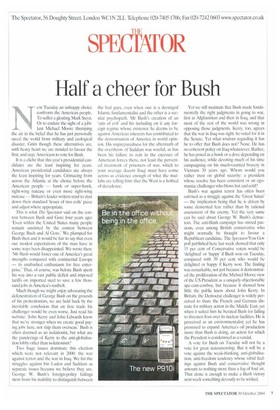SPECIATOR
Half a cheer for Bush
Next Tuesday an unhappy choice confronts the American people. To suffer a gloating Mark Steyn. Or to endure the sight of a jubilant Michael Moore thumping the air in the belief that he has just personally saved the world from military and ecological disaster. Grim though these alternatives are, with heavy heart we are minded to favour the first, and urge Americans to vote for Bush.
It is a clicbe that this year's presidential candidates are the least inspiring for years. American presidential candidates are always the least inspiring for years. Grimacing from across the Atlantic at the choice before the American people — hawk or super-hawk, right-wing nutcase or even more right-wing nutcase — Britain's leader writers tend to dust down their standard 'lesser of two evils' piece and adjust where appropriate.
This is what The Spectator said on the contest between Bush and Gore four years ago: 'Even within the United States many people remain unstirred by the contest between George Bush and Al Gore.' We plumped for Bush then and it would he fair to say that even our modest expectations of the man have in some ways been disappointed. We wrote then: 'Mr Bush would foster one of America's great strengths compared with continental Europe — its unabashed enthusiasm for free enterprise,' That, of course, was before Bush spent his way into a vast public deficit and imposed tariffs on imported steel to save a few thousand jobs in America's rustbelt.
Much though we might enjoy advocating the defenestration of George Bush on the grounds of his protectionism, we are held back by the inevitable conclusion that on free trade his challenger would be even worse. Just read his website: 'John Kerry and John Edwards know that we're stronger when we create good paying jobs here, not ship them overseas. Bush is often damned as an isolationist, but what are the panclerings of Kerry to the anti-globalisadon lobby other than isolationism?
Two huge issues dominate this election which were not relevant in 2000: the war against terror and the war in Iraq. We list the struggles against bin Laden and Saddam as separate issues because we believe they are. George W. Bush's foreign-policy failings stem from his inability to distinguish between the had guys, even when one is a deranged Islamic fundamentalist and the other is a secular psychopath. Mr Bush's creation of an 'axis of evil' and his including on it any foreign regime whose existence he deems to be against American interests has contributed to the demonisation of America in world opinion. His unpreparedness for the aftermath of the overthrow of Saddam was woeful, as has been his failure to rein in the excesses of American forces there, not least the perverted treatment of prisoners of war, which to your average decent Iraqi must have come across as evidence enough of what the mullahs are telling him: that the West is a hotbed of decadence. Yet we still maintain that Bush made fundamentally the right judgments in going to war, first in Afghanistan and then in Iraq, and that most of the rest of the world was wrong in opposing those judgments. Kerry, too, agrees that the war in Iraq was right: he voted for it in the Senate. Yet what wisdom regarding it has he to offer that Bush does not? None. He has no coherent policy on Iraq whatsoever. Rather, he has posed as a hawk or a dove depending on his audience, while devoting much of his time campaigning on his much-vaunted bravery in Vietnam 30 years ago. Whom would you rather trust on global security: a president whose resolve has been consistent or an egomaniac challenger who blows hot and cold?
Bu.sh's war against terror has often been satirised as a struggle against the 'Great Satan' — the implication being that he is driven by some demented fear rather than by rational assessment of the enemy. Yet the very same can be said about George W. Bush's detractors. The anti-Bush campaign has stirred passions, even among British conservative who might normally be thought to favour a Republican candidate. The SpectatorlYou Gov poll published here last week showed that only 15 per cent of Conservative voters would be 'delighted' or 'happy' if Bush won on Tuesday, compared with 39 per cent who would be delighted or happy if Kerry won. The finding was remarkable, not just because it demonstrated the proliferation of the Michael Moore view of the US President as a uniquely objectionable ape-cum-cowboy, but because it showed how little the public know about John Kerry. in Britain, the Democrat challenger is widely perceived to share the French and German distaste for military action in the Middle East; yet when it suited him he berated Bush for failing to threaten Iran over its nuclear facilities. He is perceived as an environmentalist; yet he has promised to expand America's oil production more than Bush is doing, an action for which the President is condemned as a vandal.
A vote for Bush on Tuesday will not be a vote for great statesmenship. But it will be a vote against the weak-thinking, anti-globalisation, anti-freedom tendency whose rabid feelings against Bush and conservative thought amount to nothing more than a fog of foul air. That alone is enough to make a Bush victory next week something devoutly to be wished.


















































































































 Previous page
Previous page